We have had an amazing time in Uganda, and our work here is not quite done, but I thought you might appreciate an update on all that has been happening. One of the big challenges of this trip has been that our team members are spread out, over two cities (well, OK, one is a town on the edge of rural Uganda!), and nine projects, some of which have required extensive travel over challenging roads. And it’s difficult to sum up our “group” experience, since each of us has met new people, different business challenges, and a variety of encounters and adventures that have shaped our personal responses to Uganda.
But we have all encountered friendly, helpful, and grateful people, wherever we have gone, and it has been heartwarming to see how the language of business and economic development has been relatively easy, despite some interesting cultural and geographical differences. We are also blessed to be visiting a culture where graciously hosting guests is an important social value; everyone we meet says, warmly and with enthusiasm, “You are very welcome to Uganda,” followed by a warm smile and, usually, with the offer of food!
One moment stands out for me, not because it is somehow brighter than the others, but because it seems to symbolize the work we are doing here. I am working, with several students, on the Wekembe project, which is a microfinance scheme (their word, not mine) that empowers women organized through local parishes of the Roman Catholic church. I have visited two local “branches” of the Wekembe “bank” – centered on benches in the local parish hall, where loan payments are collected by deposit by the branch treasurer. At yesterday’s visit the women jumped up and sang a Ugandan welcome song to me, in four part harmony, and then rose, one by one, to give what they called “testimony” about eh effect of the Wekembe project on their lives (Wekembe means, roughly, “we will struggle together to overcome our difficulties”). In Ugandan culture, the women are responsible, physically and financially, for raising children, so the goal of many of these women is to earn enough extra household cash to pay for school fees for their children. Several women stood up to tell me about a variety of business ventures that Wekembe had funded, including an expanding phone card business, money for a chicken coop, feed, and baby chicks, an interesting farm plan where pigs and bananas were raised in a sort of symbiotic way (waste from the pigs used to fertilize the banana trees, and vegetation from the banana “plantation” used to feed the pigs!), and an ingenious idea that turned a vacant lot into a car park, complete with refreshment stand and, because of the latest loan, a small refrigerator to provide cold drinks. After their stories, I asked about challenges they had faced and overcome, what benefits and changes they had experienced as a result of the Wekembe program, and some questions about “bankability” (instead of traditional collateral, Wekembe uses the group as a way of establishing bankablity for its members; when one woman is unable to make her biweekly payment, other members of her subgroup must pay for her, and should one default, the entire group is required to repay her loan – of course they will encourage her, to pay, as you might imagine, in lots of creative ways). I also aksed them to sing again for me, so I could make a short movie (aren’t digital cmaerss wonderful, and I even sang a hymn for them. But then I asked them to tell me something they were proud of because of their Wekembe experience, and every woman there jumped up – even the shy ones who had said nothing thus far – and wanted to share with me their experience of feeling economic independence, of pride in their work and how it made life better for their families, and of how much it meant to them to feel as though they did not depend on anyone – husbands, church, aid workers, or anyone – for handouts. Given our goal of working to establish self-reliance, through sharing business education rather than simply giving funds, I was speechless. Then, of course, we adjourned to the home of one of the businesswomen, who showed me her farm and then fed all of us samples of her catering business.
Many of our other projects have led to similar experiences. Our peanut sheller project, based on a revolutionary peanut sheller created by the Full Belly Project in the US, is working to spread affordable shelling technology for shelling nuts around the world; this has the potential to increase the profits farmers make from their peanuts (called more commonly “groundnuts” here) by 40 to 60 percent. It also provides an interesting side effect: the shells are useful fuel, and could be sold by the farmers as fuel to cement companies or other ventures that currently use carbon-based fuels for heat or other needs. The three young men working on this project have traveled all over Uganda, meeting with farmers, cement company representatives, Rotarians (who are interested in sponsoring the project – each sheller costs about $75 US), and agricultural agents, along with some interested entrepreneurs who want to support rural agricultural development (again, primarily an activity of women). We have encountered some roadblocks and challenges, but this group has laid the groundwork for a pilot project of manufacturing the shellers in Uganda getting them to farmers, and working with cement companies to fill trucks that otherwise return empty with peanut shells to use as fuel.
Other projects include a family-owned transportation business, which is also working with the UN to haul food and supplies to relief camps in the troubled northern part of Uganda, RUCREF (Rural Credit Finance), another microfinance company that works to have fund rural business projects (using more traditional “bankablity” criteria than Wekembe), Mityana College, a secondary school that is trying to build a curriculum based on skills rather than traditional education, an affordabel housing initiatiev, HOSFA (Homes shared for famlies), which provides hoems, education, and health care for AIDS orphans, the Kolping Society, a women’s empowerment initiative, and a coffee company that is trying to recover business lost during the difficult political times of years past.
We're ready to come home, but we're sorry to leave our new friends. See you soon!
UGANDA 2007
Kampala & Mityana
Ugandan Countryside
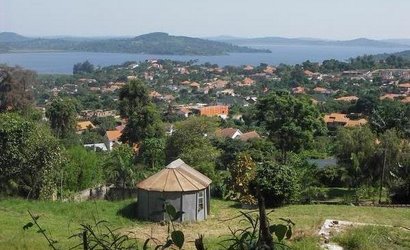
a view of Lake Victoria
Subscribe to:
Post Comments (Atom)
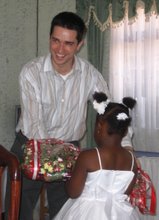
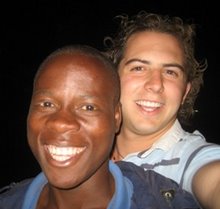
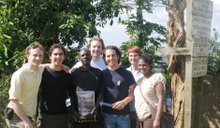
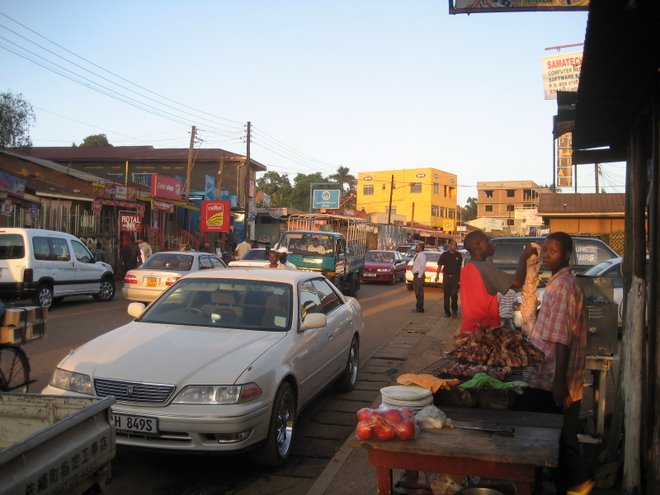
No comments:
Post a Comment